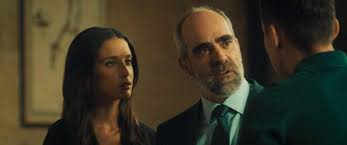



“Adagio” is a classic 100 minute thriller in a 126 minute package.
Director and co-writer Stefano Sollima takes his sweet time setting the scene — which he never identifies as greater Rome, Lazio — and takes even longer letting us know what we’re diving into, a tale of blackmail involving mobsters, dirty cops and a young pawn trapped in two worlds.
Sollima takes a longer while introducing the disparate characters, and longer still to identify them by name and association. This slow, “make the audience come to you” mystery becomes seriously tedious, after a while.
Although there are grace notes and riveting touches in the later acts, the finale proves to be an anti-climax as Sollima draws things out some more. He doesn’t even know when to drop the mike.
But it’s all there in the not-exactly-ironic title. As any classical music fan can tell you, “Adagio” means “slowly” in Italian.
We follow the young, headphone-wearing music fan (Gianmarco Francini) into one of those lurid, over-the-top, over-designed movie versions of a disco, where the team of cops tracking “the puppy” have their orders, which they’ve passed on to him. Get something that incriminates someone on one of the many surveillance cameras they’ve planted there.
The kid is in over his depth, surrounded by drag queens and drugs, which he is more than happy to sample. Realizing he’s incriminating himself, he bolts.
That draws out single-father-of-two detective Vasco (Adriano Giannini), in a fury and using his team’s tech expert and “cleaner” (Lorenzo Adorni) and muscle (Francsco Di Leva) as he hunts their “puppy” down.
Whatever their credentials, tech and surveillance expertise, these cops are up to no murderous good.
The kid, Manuel, lives with his aged, addled father (Toni Servillo) whose gangland name — “Daytona” — he drops as he scampers about, trying to find “help” to save his skin and get him out of this jam. He turns to the blind mobster (Valerio Mastandrea) nickamed Polniuman. And Polniuman (say it aloud) sends Manuel to bald, scowling “I can’t help you” badman “Romeo,” played with a largely internalized menace by Pierfrancesco Favino.
“You know a lot of things you shouldn’t know,” “the puppy” is told (in Italian with English subtitles). The viewer? We know little, but we start to find things out, bit by bit as this Byzantine scheme unfolds.
There are old grudges and ancient alliances in play here, old mobster codes and big money and Italian politics being manipulated by dirty cops out for a payday.
A couple of twists remind us of true pieces of American gangland lore — the pose mob boss Vincent Gigante affected for his own safety, etc. And the film’s climax has a brute elegance that makes us long for the more streamlined story that should have led to it.
The Rome depicted here is threatened by wildfires which lead to constant power outages, often at dramatically opportune moments. Sollima (“Gomorrah,” “Sicario 2”) likes telling tales with sweep and allegorical darkness. But even taking that into account, this picture is slow right to the edge of dullness.
Nepo baby Giannini — son of Giancarlo — has the film’s showiest role, a cop who has lost the plot and crosses from “Get that money” to “Clean this up” to “Kill that kid, no matter what.”
But it is the old men and their old ways that carry this slow-footed thriller, with Favino (“Angels & Demons,” “World War Z”) and Servillo (“Il Divo”) lending their “old men still capable of violence” gravitas to a story that would have been better served by quicker pacing.
Rating: TV-MA, bloody violence, drugs, sexual content, profanity
Cast: Pierfrancesco Favino, Toni Servillo, Gianmarco Francini, Adriano Giannini, Valerio Mastandrea, Lorenzo Adorni, Francesco Di Leva and Silvia Salvatori.
Credits: Directed by Stefano Sollima, scripted by Stefano Bises and Stefano Sollima. A Netflix release.
Running time: 2:06


















